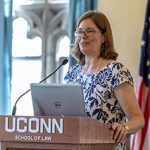
Throughout her career as an educator, associate professor Elizabeth Howard says she has always seen teaching and supporting English Learners as a shared responsibility. Her vision led to the development of the Neag School’s Educating Bilingual Learners online graduate certificate program. The program offers general education teachers and other school personnel an opportunity to learn how to better support English Learners in their classrooms. The four-class, 12-credit graduate certificate can be earned fully online, making it accessible to educators across the country.
“The whole point of this program is to support people who don’t want to be specialists — people who love being a secondary math teacher or love being a school psychologist — but they have a lot of English Learners in their school and they want to be effective with them,” says Howard.
The program offers general education teachers and other school personnel an opportunity to learn how to better support English Learners in their classrooms.
English Learners are the fastest-growing population in U.S. public schools, according to the National Education Association. This rise puts increasing demand on English as a Second Language (ESL) specialists and calls for general education teachers and other school personnel to be knowledgeable about how to support English Learners in their roles. Howard says that even in the best-case scenario, English Learners do not spend more than a few hours a week with an ESL specialist.
“Most of the time, our English Learners are not with ESL specialists, and so if everyone doesn’t have a baseline understanding of how to help support them, they are not going to succeed,” she says.
Designing Diverse Coursework

The idea for the Educating Bilingual Learners Graduate Certificate came as part of a previous grant proposal that Howard had drafted with former Neag School faculty member Erica Fernández. When denied funding for the grant, Howard continued to pursue the idea. Neag School assistant professors Michele Back and Danielle Filipiak, as well as Howard’s former graduate student Eileen Gonzalez, have been instrumental in helping develop the certificate courses.
The program consists of four graduate-level courses designed to cover several content areas:
- Multicultural Education: building a foundational understanding of cross-cultural issues and the assets that English Learners, their families, and their communities bring to the classroom
- Educational Linguistics: focusing on the linguistic assets of bilingual learners and the language acquisition process
- Sheltered Instruction: using a scaffolded approach to support students in a classroom where the instruction is happening in a language other than their home language
- Language Diversity and Literacy: combining the themes discussed in the other three courses, with a specific focus on literacy development for English Learner students
“The whole program is designed to think about things from an asset-based perspective, to think about the benefits and the assets of the students and their families and their communities, and how to incorporate that into the classroom through culturally sustaining pedagogy,” says Howard.
For educators who may wish to go on to become specialists who work with English Learners, it is important to note that these courses are all on the state-approved course lists for Connecticut’s Teachers of English to Speakers of Other Languages (TESOL) and bilingual cross-endorsements. Howard says they selected courses across four different competency areas for both cross-endorsements to ensure appropriate depth and breadth of knowledge, and to enable participants to continue toward earning the cross-endorsements if they choose.
Howard says she hopes the educators who pursue the Educating Bilingual Learners certificate will come away with a sense of all the assets and resources that English Learners and their families bring, and learn how to incorporate those assets in the classroom.
Flexibility and Inclusivity in Online Education
When designing the program, Howard says she wanted to be inclusive of practicing educators in the field as well as pre-service education students who want to earn the certificate as they launch their teaching careers. The asynchronous online format allows people the ability to participate according to their own schedules. The program also allows participants to complete the program at a flexible pace, offering up to two academic years for completion if needed.
“For some people, taking two classes in the fall and two classes in the spring is not going to be sustainable, either financially or time-wise,” says Howard. “I wanted to make sure there were summer course offerings for practicing teachers in particular, who may find it appealing to be able to take up to two of the classes in the summertime.”
Some classes may also be offered face-to-face at the Storrs or Hartford campuses.
New Perspectives and Shared Responsibilities
Howard says she hopes the educators who pursue the Educating Bilingual Learners certificate will come away with a sense of all the assets and resources that English Learners and their families bring, and learn how to incorporate those assets in the classroom.
“If we can acknowledge it, respect it, and use it in our instruction, I think it can help us go a long way toward meeting their needs,” says Howard.
She also hopes to instill a sense of shared responsibility among educators when it comes to teaching and supporting English Learners. It is not only up to the individual ESL or bilingual teacher to support these students; it is a group effort among all educators, says Howard.
Applications are currently being accepted for the Summer 2020 semester. A bachelor’s degree is required, and all application materials should be submitted no later than May 15.
Learn more about the Educating Bilingual Learners Online Graduate Certificate program.
 Facebook
Facebook
 Twitter
Twitter
 LinkedIn
LinkedIn
